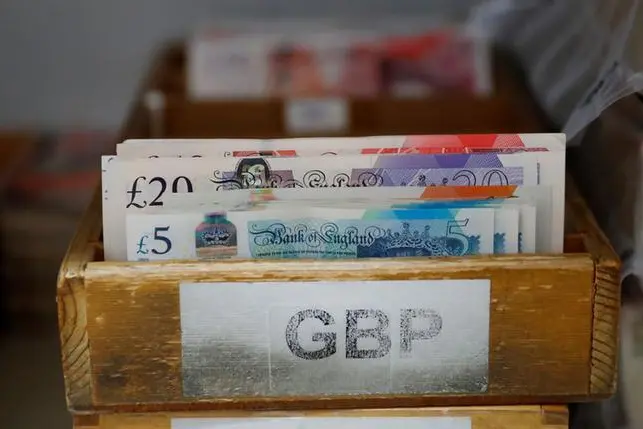PHOTO
LONDON- Sterling fell almost 1 percent against the dollar on Thursday, retreating from nine-month highs as traders braced for this week's third parliamentary Brexit vote, this time on whether to delay Britain's March 29 deadline for exiting the EU.
The pound on Wednesday enjoyed its biggest one-day gain against the dollar since last April after UK lawmakers resoundingly voted to reject a no-deal Brexit.
Investors expect the result could prompt eurosceptic parliamentarians to finally back the unpopular deal Prime Minister Theresa May negotiated with the EU, or lead to a long Brexit delay that could eventually reverse the result of the 2016 referendum.
Both of those scenarios would be positive for sterling by ruling out a disorderly exit from the European Union.
However, some of the optimism has given way, with no sign that lawmakers can reach any consensus on amending May's deal so it is acceptable to all sides and the EU.
Tim Graf, head of macro strategy at State Street Global Advisors, said chances of no-deal Brexit had now fallen to less than 5 percent and described himself as positive on the pound. But he warned risks still remained.
""There is gradual optimism being priced in ... It's clear parliament are starting to exert themselves more forcefully," Graf said.
But he added: "There is always the chance the EU won't grant an extension if they are just going to be trying to push this deal through ... that's where the caution comes in."
Lawmakers will vote later on Thursday on delaying Britain's EU departure beyond March 29. However all 27 EU members must approve the extension.
May is also pushing lawmakers to vote again next week on a deal they have twice rejected.
Sterling has swung wildly this week between $1.30 and $1.33 and at junctures it has been at its most volatile since the June 2016 Brexit referendum.
It surged more than 1 percent against both the dollar and euro on Wednesday as parliament voted resoundingly against leaving without a transition agreement.
It hit a peak of $1.3380. Against the euro it had traded as high as 84.72 pence, approaching recent 22-month highs
However, it later retreated from those levels as traders contemplated the array of possibilities that have opened up, including a second referendum or a general election.
By 1045 GMT the pound was 0.9 percent lower at $1.3229. Versus the euro, it was down 0.6 percent at 85.46 pence.
Options markets show implied sterling volatility - a gauge of expected swings in a currency - still elevated, with two-week vols jumping off one-week lows touched on Wednesday.
Volatility could also stem from amendments lawmakers have filed before the vote; one seeks a second Brexit referendum while another aims to rule it out. If the former is passed, the pound could rally further, based on hopes that voters will reverse the results of the original 2016 referendum.
(Reporting by Sujata Rao and Tom Finn; Editing by Alison Williams) ((Sujata.rao@thomsonreuters.com +44 207 542 6176))





















